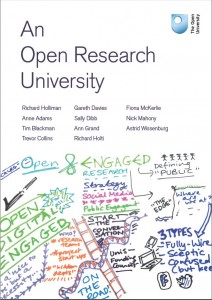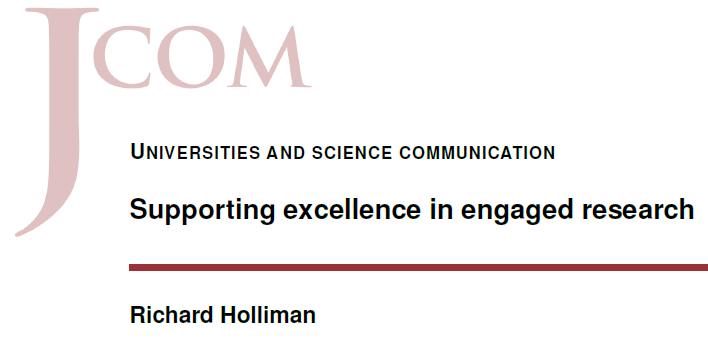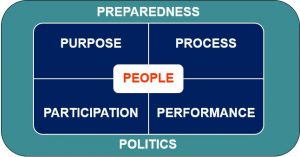
Professor Richard Holliman, The Open University.
I’ve recently had a paper published as part of a collection that explores professionalisation in science communication (Trench, 2017). In the paper, I review the purposes, definitions and criteria designed to embed ‘engaged research’ as a strategic priority with universities, and explores some of the challenges of implementation (Holliman, 2017).
I argue that surveys of academics have shown various understandings of, and attitudes to, the practices of engaged research, but also impediments to realising the aspirations it expresses.
Drawing on my experience as the academic lead for engaged research at the Open University, I go on to explore questions of professionalisation, for example, through training, support mechanisms and measures of recognition for engaged research.
I conclude the paper by arguing that, if done well, engaged research can promote epistemic justice. So what is epistemic justice, and how can engaged research deliver what Medvecky (2017) calls ‘fairness in knowing’.

An open research university (Holliman et al. 2015). Design: Peter Devine. Image: Beck Pitt.
I’ve worked with a wide range of OU colleagues to address issues of professionalisation in engaged research (see the Acknowledgements at the end of this post).
Through this work to embed culture change in academic practices, we have linked these purposes, arguing that, if done well and over time, engaged practices can enhance the quality of research, improve the social and economic significance of the resulting impacts for all participants, and generate evidence of sustained excellence in academic practice (e.g. Holliman and Warren, 2017; Scanlon, 2017).
Addressing the need to improve the quality of engaged research through superior academic practices has a moral imperative (Medvecky and Leach, 2017), connecting this agenda to questions of epistemic injustice (Fricker, 2007) and the promotion of ‘fairness in knowing’ (Medvecky, 2017).

Supporting excellence in engaged research (Holliman, 2017).
Approaching engaged research in this way addresses the two forms of epistemic injustice that Fricker (2007) identifies: testimonial and hermeneutical.
Testimonial injustice
Testimonial injustice raises questions about who should have a voice in research, but also how voices in research are heard in wider society (Medvecky, 2017). ‘Who could/should have a voice in research?’, ‘Who is excluded, why, and is this justified?’
Colleagues at the Open University proposed a solution to this challenge by calling for researchers to work ‘upstream’ to improve their preparedness to co-create ‘publics’ for research (Mahony, 2015).
Hermeneutical injustice
In describing hermeneutical injustice, Fricker (2007) describes an absence of knowing that an injustice has occurred, allied with a lack of opportunities and the skills necessary to participate.
I argue that this applies to engaged research in two ways:
- whether researchers have a shared understanding of the principles and practices of engaged research; and
- whether participating ‘publics’ have sufficient conceptual grounding in engagement to be able to contribute in ways that are meaningful to them and to the research in question.

Planning for school-university engagement with research: preparedness, politics, people, purposes, processes and performance Holliman et al. 2017.
Improving levels of hermeneutical justice through engaged research places a responsibility on researchers and research managers to explore why they (and their ‘publics’) are engaging, how, when (and how often), where and to what ends.
Care and attention need to be taken in how engaged research should take place to ensure that the mechanisms are fair, equitable and appropriate. These decisions should ideally be made upstream, although I acknowledge, like others, that in some instances they will need to be revisited at appropriate points in the research cycle (Holliman et al. 2017).
References
Fricker, M. (2007). Epistemic injustice: Power and the ethics of knowing. Oxford: Oxford University Press.
Holliman, R. (2017). Supporting excellence in engaged research. JCOM, 16(5), C04, http://oro.open.ac.uk/52439.
Holliman, R., Davies, G., Pearson, V., Collins, T., Sheridan, S., Brown, H., Hallam, J. and Russell, M. (2017). Planning for engaged research: a collaborative ‘Labcast’. In Kucirkova, N. and Oliver Quinlan, O. (eds.) The Digitally Agile Researcher. Open University Press, Maidenhead, 88-106, http://oro.open.ac.uk/50411.
Holliman, R. and Warren, C.J. (2017). Supporting future scholars of engaged research. Research for All: Advancing Public Engagement with Research, 1(1), 168-184, http://oro.open.ac.uk/48223.
Mahony, N. (2015). Designing Public-Centric Forms of Public Engagement with Research. Milton Keynes: The Open University, http://oro.open.ac.uk/42551.
Medvecky, F. (2017). Fairness in knowing: Science communication and epistemic justice. Science and Engineering Ethics, https://doi.org/10.1007/s11948-017-9977-0.
Medvecky, F. and Leach, J. (2017). The ethics of science communication. JCOM, 16(04), 1-5, https://jcom.sissa.it/archive/16/04/JCOM_1604_2017_E.
Scanlon, E. (2017). ‘Concepts and challenges in digital scholarship’, Frontiers in Digital Humanities: Digital Scholarship, 4(15), 1-3, https://doi.org/10.3389/fdigh.2017.00015.
Trench, B. (2017). Introduction to Commentary on Universities and Science Communication, JCOM, 16(6), https://jcom.sissa.it/archive/16/05/JCOM_1605_2017_C01
Acknowledgements
The research discussed in this paper was supported through the following awards: RCUK Public Engagement with Research Catalyst (EP/J020087/1); RCUK School University Partnership Initiative (EP/K027786/1); and a NERC Innovation Award (NE/L002493/1).
